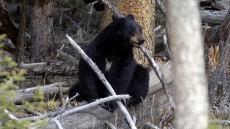VANCOUVER — Work on a Trans Mountain pipeline crossing in a British Columbia stream has destroyed salmon habitat, raising concerns about the Crown corporation's ability to build infrastructure through waterways if the expansion project proceeds, a scientist says.
Mike Pearson says the "amateur hour" work on the Stewart Creek crossing in Chilliwack will reduce food sources for coho and chum salmon and limit their ability to hide from predators. The fish are part of the diet of endangered southern resident killer whales.
"There was no consideration given whatsoever to the habitat, which is just not acceptable," said Pearson, a biologist with 30 years' experience, in an interview.
Trans Mountain Corp. filed documents with the National Energy Board showing its plans to cover exposed pipe in the Fraser Valley creek. It wrote that it would place concrete mats in the channel, extending about eight metres upstream and nine metres downstream of the exposed line, and cover it with small stones.
Pearson said the work was completed in August to September of last year. He visited the site in December and took photos that he says show most of the stones have been swept away by currents, leaving the concrete blocks exposed.
"The work has degraded habitat in several ways," he wrote in an assessment filed with the energy board by intervener Yarrow Ecovillage.
The smooth, hard concrete provides no hiding places for salmon, supports very few of the aquatic invertebrates they feed on, inhibits plant growth and prevents fish from burying their eggs, the document says.
Pearson believes it's not an isolated incident. An assessment he did of a pipeline creek crossing on Sumas Mountain in 2015 for Pipe Up Network, an anti-pipeline group, concluded the site was physically unstable and reconstructed with materials inappropriate to restoring habitat.
A stream-keeper has also raised concerns about excavation at Trans Mountain's terminal in Burnaby. John Preissl has filed several complaints with the energy board alleging the work has caused sediment to fall into two salmon-bearing creeks.
Federal and provincial officials inspected the terminal in April and found improperly installed sediment and erosion control measures. A follow-up energy board report concluded Trans Mountain had fixed the problems by the end of November.
Trans Mountain said in a statement that the BC Oil and Gas Commission approved its Stewart Creek work and found no issues in site inspections during and after construction.
It said a third-party engineer designed the plan to protect the exposed line and conducted a study to ensure it would not impede fish passage. Environmental plans were created and work was monitored full-time by a qualified environmental professional, it said.
As for Pearson's 2015 criticism of the Sumas Mountain crossing, Trans Mountain said an independent environmental consultant completed an assessment and made a management plan. The work was monitored by an environmental professional and the oil and gas commission found no issues.
It also said "extensive" sediment control measures and mitigation efforts are in place at its Burnaby terminal.
The corporation added that field crews investigated all potential watercourse crossings for its expansion project even before it applied to the energy board for approval.
"The information gleaned from this fieldwork allows us to avoid or minimize impact to fish and fish habitat during pipeline construction," it said, adding environmental inspectors will monitor construction.
Prime Minister Justin Trudeau's government has purchased the pipeline and expansion project for $4.5 billion.
The expansion would triple the capacity of the existing line that runs from the Edmonton area to Burnaby. The energy board completed its first review in 2016 and recommended the government approve the project with 157 conditions.
In its report, the board wrote the watercourse crossing plans "would effectively reduce the extent of effects on fish and fish habitat."
Ten conditions relate to fish, including that the company must file details on the presence of fish and fish habitat with the board before starting construction on watercourse crossings.
Most of the conditions are "a plan to make a plan," argued Eugene Kung, a lawyer with West Coast Environmental Law.
"They don't have any actual measurable effect on the outcome."
The Federal Court of Appeal quashed the project's approval in August in part due to the board's failure to consider marine shipping impacts. The government ordered the board to conduct a new review looking at this issue and produce a report by Feb. 22.
Scientists and environmentalists say the new review, which is limited to 12 nautical miles off B.C.'s coast, is neglecting the streams and rivers that support salmon.
Board spokesman James Stevenson said it will consider all evidence on the record relevant to assessing impacts of project-related marine shipping, including but not limited to impacts on southern resident killer whales.
"Some parties have filed evidence regarding (southern resident) prey, including salmon," he said.
The board rejected Pearson's evidence because Yarrow Ecovillage filed it nine days after a December deadline, but the board noted the evidence "may have some relevance as it pertains to salmon, which is a food source of the (southern residents)."
Chinook salmon comprise roughly 80 per cent of southern resident orca diet in the summer, but chum, coho and steelhead trout make up about 14 to 18 per cent, and little is known of their winter diet, said Pearson in his filing with the energy board.
Paul Spong, founder of Orca Lab research station on Vancouver Island, said chum are the whales' second choice after chinook, adding that starvation is the biggest threat to their survival.
"Anything that interferes with salmon using river systems is detrimental to the orcas."


